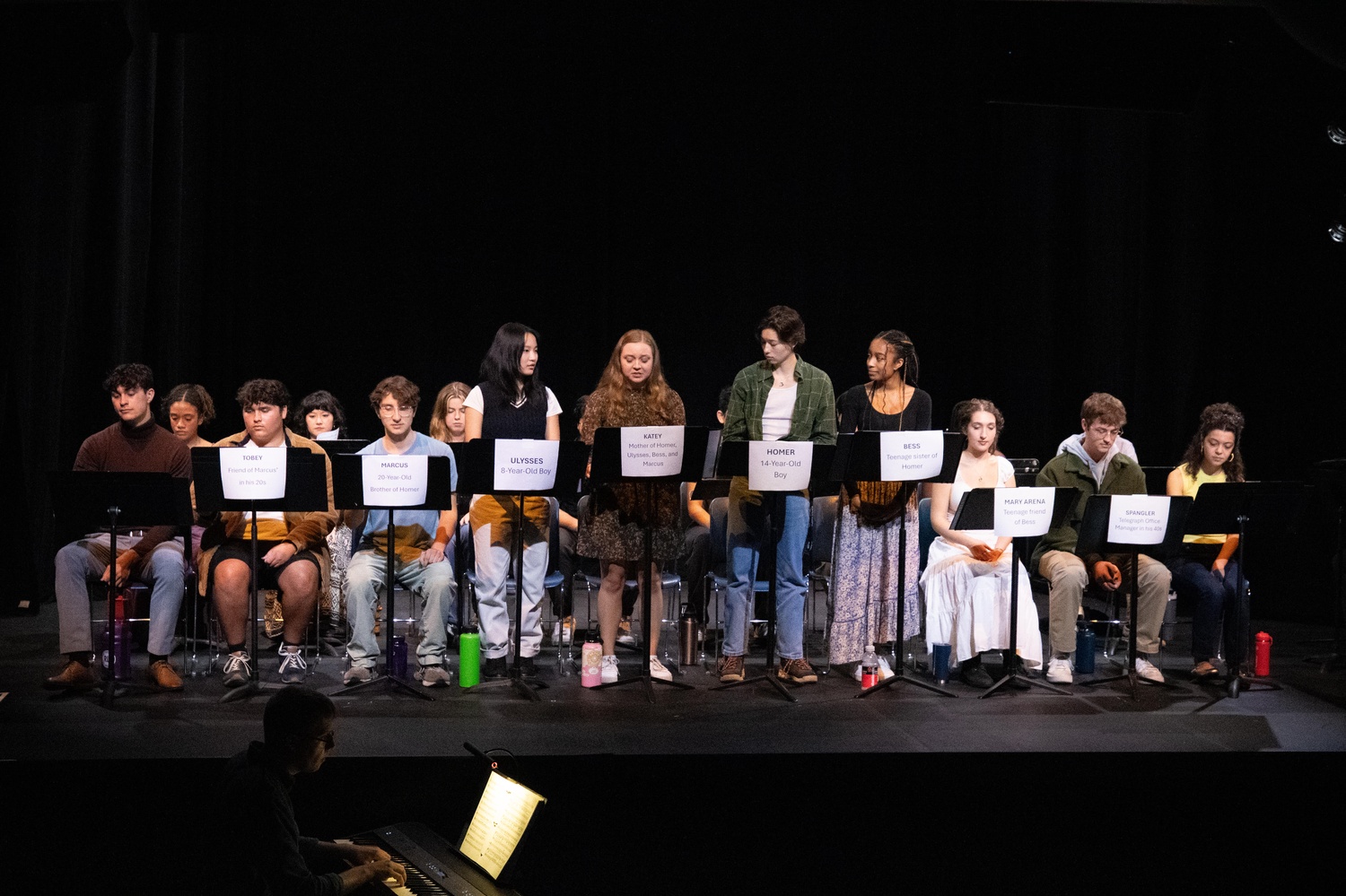
News
Summers Will Not Finish Semester of Teaching as Harvard Investigates Epstein Ties

News
Harvard College Students Report Favoring Divestment from Israel in HUA Survey

News
‘He Should Resign’: Harvard Undergrads Take Hard Line Against Summers Over Epstein Scandal

News
Harvard To Launch New Investigation Into Epstein’s Ties to Summers, Other University Affiliates

News
Harvard Students To Vote on Divestment From Israel in Inaugural HUA Election Survey
Broadway Professionals and Harvard Students Stage Developmental Reading of ‘The Human Comedy’

Dozens attended the staged reading of “The Human Comedy,” a rework of the 1983 musical by William Dumaresq and Galt MacDermot, on Saturday, Sept. 21 at the Agassiz Theatre. The reading, presented by Harvard’s Office for the Arts and the Harvard Radcliffe Dramatic Club as part of the inaugural Creative Careers Conference, wrapped up a developmental workshop led by Broadway professionals and staffed by Harvard undergraduates. A discussion featuring the creative team followed the performance.
“The Human Comedy” — based on the 1943 novel by William Saroyan — centers on small-town teenager Homer (Elio R. Kennedy-Yoon ’25), who takes a job as a telegram delivery boy amid World War II. With his brother deployed in battle, Homer encounters the sorrows brought by War Department messages firsthand while maintaining hope and humor with his family.
While the original Broadway production was met with commercial failure, the Harvard workshop reworked the music and book for the current day. Known within the theatrical world as a “29-hour reading,” the reading was the first test of the material in front of a live audience after a limited rehearsal period. Now, the creative team will meet to discuss potential plans for the show’s future.
A student cast performed the show’s dialogue and music, with some onstage narration by directing assistant Maranatha Paul ’27, in the absence of full staging. The theater professionals in the post-performance discussion included director Sammi Cannold — a graduate of the Harvard Graduate School of Education — composer-lyricist Sam Willmott, commercial producer Jack Viertel ’71, and composer-lyricist Robert Baumgartner.
Cannold discussed how developing “The Human Comedy” required complex consideration of “three different eras”: the era when it was written, the era in which it was first performed, and the current era. Changes involved removing content now widely considered offensive, like jokes about domestic violence. Additionally, Willmott wrote new lyrics for Homer’s sister Bess (Gabrielle M. Greene ’27) to illustrate how women contributed to the war effort.
Baumgartner knew MacDermot personally from assisting him on the 2009 Broadway revival of “Hair,” which was racially groundbreaking when it premiered in 1967. According to Baumgartner, MacDermot — the composer of “Hair” — was a progressive artist who would’ve been “on board with those changes.”
The speakers also encouraged students interested in a career in the arts to pursue all opportunities, identify strengths through exploration, and be authentic when making professional connections by approaching genuinely inspiring mentors — as Baumgartner did with MacDermot — and valuing peer relationships.
“When you say yes enough times, I think good things begin to happen to you,” said Viertel.
“Just two pieces of advice: The first one is ‘Tell the truth,’ and the second one is, ‘Don’t be boring,’” said Baumgartner.
In interviews with The Harvard Crimson, Cannold, Willmott, and Paul praised the intellectual and enthusiastic nature of the student-professional collaboration, which spanned producing, directing, writing, music, stage managing, and technical aspects of the show.
“We also had the opportunity to engage academically about the material and to hear what the students were thinking, to get their feedback,” said Cannold. “And that was really fantastic.”
“I felt that I could speak my opinion and really feel like I had a hand in what was actually happening for the show, which was crazy, because these are some of the big names here,” added Paul.
While the “infectious and incredible” score drew Cannold to the project, Willmott was moved by the surprising depth of emotion that the story develops through seemingly mundane scenes, from songs about coconut cream pie to conversations between homesick soldiers.
“You look back on the whole thing and realize how incredibly sacred and special the everyday is,” said Willmott.
The outdated aspects of “The Human Comedy” prompted contemplation on whether the show had a place in today’s theater landscape. But the team believed that the emotional truth of a story about everyday life set against war and death endured even in today’s digital age.
“It’s a timeless coming-of-age story about understanding that there’s a world larger than the one that you might live in yourself,” said Paul.
As narrator and pianist, respectively, Paul and Willmott were impressed by the student cast’s performance on Saturday and enjoyed experiencing the “alchemy of the art” — according to Willmott — from a participant’s perspective.
“Everyone sang their heart out,” said Paul. “And the audience was a huge part of why it was such a success. They laughed when we wanted them to laugh. They cheered when we wanted them to cheer.”
“The Human Comedy” ran at the Agassiz Theatre on Sept. 21.
—Staff writer Isabelle A. Lu can be reached at isabelle.lu@thecrimson.com.
Want to keep up with breaking news? Subscribe to our email newsletter.
